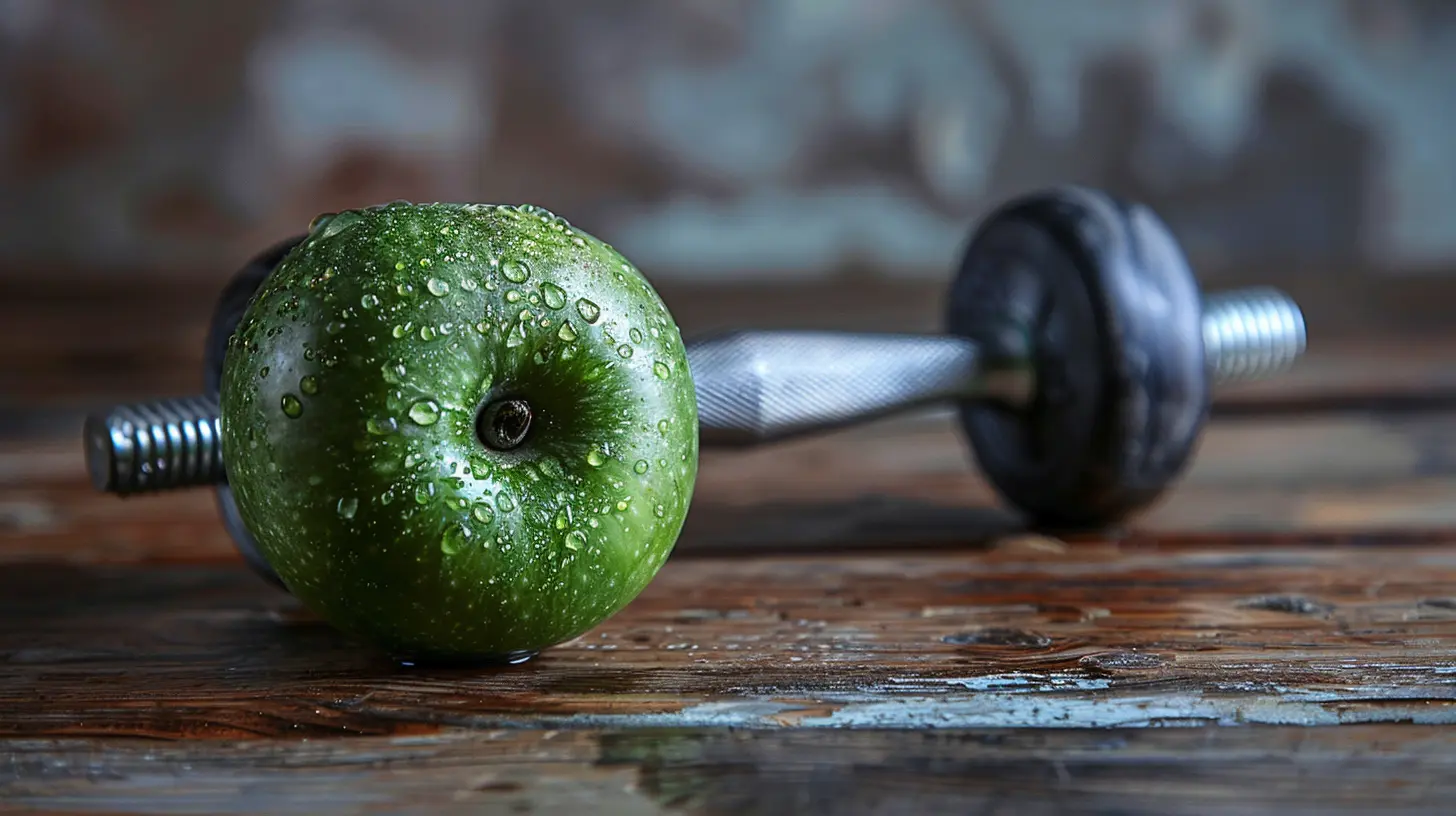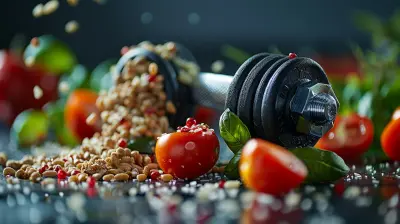Fueling for Success: Optimizing Your Diet for Peak Performance
28 December 2024
When it comes to sports, we often focus on training, technique, and mental toughness. But let’s be real – if your diet is out of whack, no amount of training is going to get you to your peak performance. It’s like trying to run a high-performance car on cheap fuel. Your body, much like that car, needs the right fuel to deliver optimal results.
So, how exactly can you fuel for success? What should you be eating to hit your max potential? Whether you’re a seasoned athlete or just starting your fitness journey, this guide will break down how you can tweak your nutrition to perform at your best.

Understanding the Role of Nutrition in Sports Performance
Before diving into the nitty-gritty, let’s get one thing straight: food isn’t just something to satisfy hunger. It’s much more than that, especially for athletes. Food is fuel. Every bite you take is either helping or hurting your performance.When you eat the right things, your body can recover faster, build muscle, and even fend off fatigue more effectively. But if you’re eating junk, you’ll feel sluggish, fatigued, and just plain off. You wouldn’t put dirty oil in your engine, right? The same logic applies to your body.
Macronutrients: The Building Blocks of a Strong Diet
You’ve probably heard of macronutrients – carbs, proteins, and fats. They’re the basic building blocks of your diet and play a crucial role in how your body performs. Let’s break them down:Carbohydrates: Your Body’s Primary Fuel Source
Carbs are like high-octane fuel for your body. They’re the fastest and most efficient source of energy, especially when you’re doing high-intensity activities like running, cycling, or weightlifting. Your body breaks carbs down into glucose, which is then stored in your muscles and liver as glycogen. When you’re working out, your body taps into these stores to keep you powered up.But not all carbs are created equal. Complex carbs like whole grains, sweet potatoes, and legumes release energy slowly, giving you sustained energy throughout your workout. On the flip side, simple carbs (think candy and soda) give you a quick spike of energy but leave you crashing soon after.
Proteins: The Muscle Repair Crew
Protein is the building block of muscle. When you work out, you’re essentially tearing your muscles apart. It sounds gruesome, but this is how muscle growth happens – through constant breakdown and repair. Protein helps with that repair process, building your muscles back stronger and more resilient.Sources like lean meats, eggs, fish, beans, and tofu are packed with essential amino acids, which are the building blocks your body needs to recover and grow.
Fats: The Slow-Burning Energy Source
Fats often get a bad rap, but they’re just as important as carbs and protein. Unlike carbs, fats provide a slow-burning energy source, which is especially useful during long-duration, low-intensity exercises like hiking or endurance cycling.Healthy fats from sources like avocados, nuts, seeds, and olive oil are best for athletes. They not only provide energy but also help your body absorb essential vitamins, protect your organs, and keep your brain functioning at its best.
Micronutrients: The Small but Mighty Players
While macronutrients get most of the spotlight, micronutrients (vitamins and minerals) are the unsung heroes of sports nutrition. They help with everything from energy production to muscle contraction. Some of the key ones include:- Iron: Vital for transporting oxygen to your muscles. Low iron can lead to fatigue and decreased performance.
- Calcium: Important for muscle function and bone health, especially for preventing injuries.
- Vitamin D: Helps with calcium absorption and plays a role in muscle recovery.
- Magnesium: Crucial for energy production and reducing muscle cramps.
Eating a variety of colorful fruits and vegetables is the easiest way to ensure you’re getting a wide range of these essential nutrients.

Timing Matters: The Art of Meal Timing
You’ve probably heard the phrase “timing is everything.” Well, that holds true when it comes to sports nutrition, too. What you eat is important, but when you eat can make or break your performance.Pre-Workout Fuel: Setting the Stage
Think of your pre-workout meal like prepping for a road trip. You wouldn’t hit the highway without filling up the tank, right? The same goes for your body. Eating a balanced meal 2–3 hours before your workout ensures you have enough fuel to power through.Your pre-workout meal should focus on carbs and protein, with a little bit of fat. Something like brown rice with chicken and veggies or a whole-grain sandwich with lean turkey works perfectly. If you’re short on time, a banana with peanut butter or a smoothie with protein powder can be a quick fix.
Post-Workout Recovery: Refuel and Rebuild
After a tough workout, your body is like a sponge, ready to soak up nutrients. This is the prime time for recovery. You’ll want to replenish your glycogen stores with carbohydrates and repair your muscles with protein.Aim to eat within 30–60 minutes after your workout. Good post-workout meals include a protein shake with a banana or a grilled chicken salad with quinoa.
Hydration: Don’t Forget the Basics
We can’t talk about fueling without mentioning hydration. Your muscles are about 75% water, and even slight dehydration can lead to a significant drop in performance. If you’re doing high-intensity workouts or exercising in the heat, you’re losing water and electrolytes through sweat.Water is always a good go-to, but for long workouts lasting over an hour, consider adding an electrolyte drink to replenish lost sodium, potassium, and magnesium.

Customizing Your Diet Based on Your Sport
Not all sports require the same type of fuel. A sprinter needs a different diet than a marathon runner, just like a weightlifter’s nutritional needs are different from a soccer player’s. Let’s take a quick look at how you can tailor your diet to your specific sport.Endurance Sports (Running, Cycling, Triathlons)
Endurance sports require a lot of sustained energy, which means your body is burning through glycogen stores as you go. Carbohydrates will be your best friend here.- Pre-Race Meal: Focus on complex carbs like oatmeal, whole-grain toast, or pancakes.
- During Event: For events lasting over 90 minutes, consider consuming easily digestible carbs like energy gels or sports drinks.
- Post-Race: Replenish those glycogen stores with a mix of carbs and protein—think a turkey sandwich or a smoothie.
Strength Sports (Weightlifting, CrossFit)
When it comes to strength training, the focus shifts more toward building and repairing muscle. Protein and fats become more essential for recovery and muscle growth.- Pre-Workout Meal: A balance of protein and carbs, such as a chicken and rice bowl.
- Post-Workout: Prioritize protein intake—something like a protein shake or a serving of lean meat with vegetables.
- Snacks: Keep high-protein snacks like Greek yogurt or a handful of nuts on hand to ensure you’re getting enough daily protein.
Team Sports (Soccer, Basketball, Rugby)
Team sports are a hybrid between endurance and strength, requiring bursts of energy and quick recovery. You’ll need a balanced mix of carbs, proteins, and fats to keep up with the demands of the game.- Pre-Game Meal: A light meal with complex carbs and some protein, like a whole-grain pasta with chicken.
- Half-Time Snack: Quick carbs like a banana or an energy bar to keep you going.
- Post-Game: A hearty meal with a balance of carbs, protein, and veggies to restore energy and aid recovery.

Supplements: Should You Use Them?
Supplements can be a touchy topic. While they aren’t a replacement for a well-balanced diet, they can fill in gaps and boost performance when used correctly. Some proven supplements include:- Whey Protein: Great for post-workout recovery, especially if you struggle to get enough protein from food.
- Creatine: Helps with muscle strength and recovery in high-intensity sports.
- BCAAs (Branched-Chain Amino Acids): Aid muscle recovery and reduce soreness.
- Caffeine: Provides a boost in endurance and focus, especially for long-duration activities.
Remember, supplements should be just that—supplements to an already solid diet, not a primary source of nutrition.
Listening to Your Body: The Key to Long-Term Success
At the end of the day, no two athletes are the same. What works for your friend or teammate may not work for you. That’s why it’s important to listen to your body. If you’re feeling sluggish or low-energy, it might be time to tweak your carb intake. If you’re struggling with muscle recovery, maybe you need to up your protein.Pay attention to how certain foods make you feel and adjust accordingly. Your body is smarter than you think, and it’s constantly giving you feedback. The secret to long-term success is learning how to interpret that feedback and making the necessary adjustments.
Conclusion: Fuel Your Body, Fuel Your Success
If you want to perform at your best, there’s no getting around it: your diet matters. By focusing on the right balance of macronutrients, timing your meals appropriately, staying hydrated, and possibly incorporating some supplements, you’ll be setting yourself up for peak performance.Remember, you wouldn’t put low-quality fuel in a high-performance car, so don’t do that to your body. Fuel it with the right foods, and watch your performance skyrocket.
all images in this post were generated using AI tools
Category:
Sports NutritionAuthor:

Umberto Flores
Discussion
rate this article
21 comments
Kalani McGlynn
Great insights on the importance of nutrition for athletic performance! Balancing macronutrients and timing meals effectively can truly enhance an athlete's capabilities. This article serves as a valuable guide for those looking to improve their performance through diet.
April 3, 2025 at 4:07 AM

Umberto Flores
Thank you for your kind words! I'm glad you found the insights valuable for enhancing athletic performance through nutrition.
Darby Lopez
Great insights! Proper nutrition is key to achieving peak performance. Staying fueled not only enhances energy but also boosts overall athletic potential. Keep it up!
February 9, 2025 at 1:28 PM

Umberto Flores
Thank you! I couldn't agree more—nutrition is vital for maximizing performance. Fueling properly truly makes a difference!
Zelda McLemore
Great insights on how nutrition impacts athletic performance! I particularly appreciated the emphasis on whole foods and hydration. It would be interesting to explore how meal timing can also play a role in maximizing energy and recovery. Looking forward to more tips in future articles!
February 4, 2025 at 1:06 PM

Umberto Flores
Thank you for your feedback! Meal timing is definitely an important factor for optimizing performance and recovery—stay tuned for more tips in future articles!
Tobias Fisher
Balanced nutrition is essential for athletes aiming for peak performance.
February 1, 2025 at 12:03 PM

Umberto Flores
Absolutely! Balanced nutrition fuels energy, aids recovery, and enhances overall performance for athletes.
Kathleen Roberson
Nutrition is key for athletes!
January 26, 2025 at 7:35 PM

Umberto Flores
Absolutely! Proper nutrition is essential for maximizing performance, recovery, and overall health in athletes.
Kalani McGinnis
Great tips on nutrition! A solid diet truly fuels athletic performance and maximizes training results.
January 23, 2025 at 5:32 AM

Umberto Flores
Thank you! I'm glad you found the tips helpful for enhancing athletic performance. Fueling properly is key to maximizing results!
Clarissa McPherson
Great insights! Optimizing nutrition is crucial for athletes. Embracing a balanced diet can significantly enhance performance and recovery. Looking forward to applying these tips in my training regimen! Thank you!
January 19, 2025 at 11:44 AM

Umberto Flores
Thank you for your feedback! I'm glad you found the insights helpful—best of luck with your training!
Rosalie Webster
Great insights on nutrition for athletes! It's crucial to fuel properly for optimal performance. I appreciate the tips shared in this article—very helpful!
January 15, 2025 at 9:00 PM

Umberto Flores
Thank you for your kind words! I'm glad you found the tips helpful for optimizing performance. Fueling properly is indeed essential for athletes!
Amira McVey
Balanced nutrition drives optimal performance.
January 11, 2025 at 12:29 PM

Umberto Flores
Absolutely! Balanced nutrition is essential for maximizing performance and overall health. It fuels both body and mind, enabling us to achieve our best.
Caroline McCune
Hidden within every bite lies the secret to unlocking your true potential. Are you brave enough to discover what’s really fueling your performance? The answer might surprise you.
January 8, 2025 at 7:39 PM

Umberto Flores
Thank you! Discovering the right fuels can indeed transform performance. Let's explore these secrets together!
Helen McGarvey
Great article! Nutrition is crucial for athletes looking to enhance performance. Remember to focus on balanced meals rich in carbohydrates, proteins, and healthy fats. Hydration is equally important—always keep water handy. A well-structured diet not only boosts energy but also aids in recovery. Keep fueling wisely!
January 5, 2025 at 12:02 PM

Umberto Flores
Thank you for your insights! I completely agree—balanced nutrition and hydration are key to maximizing athletic performance and recovery.
Julian Barnes
What specific foods or nutrients have you found most effective for enhancing athletic performance? Curious minds want to know!
January 1, 2025 at 11:26 AM

Umberto Flores
Incorporating carbohydrates for energy, protein for muscle repair, and healthy fats for sustained endurance is key. Hydration and micronutrients like vitamins and minerals also play a crucial role in optimizing performance.
Sorin Kane
This article effectively emphasizes the critical link between nutrition and athletic performance. By outlining specific dietary strategies, it empowers athletes to make informed choices that enhance endurance, strength, and recovery. Great insights!
December 31, 2024 at 7:15 PM

Umberto Flores
Thank you for your thoughtful feedback! I'm glad you found the dietary strategies helpful for enhancing athletic performance.
Reina Barron
Great insights! It’s amazing how much our diet impacts performance. I love focusing on whole foods and staying hydrated, but I could always use tips on balancing carbs and proteins. Excited to try some of the suggestions in this article to level up my game. Thanks for sharing!
December 31, 2024 at 5:53 AM

Umberto Flores
Thank you for your feedback! I'm glad you found the insights helpful. Balancing carbs and proteins is key—focus on pairing them in meals, like chicken with quinoa or Greek yogurt with fruit. Best of luck leveling up your performance!
Caden Miller
Great article! Nutrition plays a crucial role in athletic performance. Focusing on a balanced diet rich in whole foods, lean proteins, healthy fats, and adequate hydration can significantly enhance endurance, strength, and recovery. Tailoring your intake to training demands is key for optimal results.
December 30, 2024 at 1:21 PM

Umberto Flores
Thank you for your insightful comment! I completely agree—nutrition is essential for peak athletic performance, and tailoring one's diet to meet training needs can make all the difference.
Quade Henson
Great tips! Remember, fueling up isn't just about what you eat—it's about enjoying the journey too! Treat yourself occasionally, and keep that positive vibe. You're on your way to peak performance! Go for it!
December 30, 2024 at 4:00 AM

Umberto Flores
Thank you! I completely agree—enjoying the process is key to sustainable success. Balance is essential for peak performance!
Trevor Rocha
Great insights! Proper nutrition truly fuels our journey to greatness. Let’s embrace these principles and elevate our performance to new heights together! Keep pushing forward!
December 29, 2024 at 8:00 PM

Umberto Flores
Thank you! I completely agree—nutrition is key to unlocking our full potential. Let's keep striving for excellence together!
Xavi McKinnon
Balanced meals boost energy; prioritize carbs, proteins, and hydration!
December 29, 2024 at 1:02 PM

Umberto Flores
Absolutely! A balanced intake of carbs, proteins, and proper hydration is essential for maximizing energy and enhancing performance. Thanks for highlighting this!
Kendra Davis
Great article! Nutrition is key to unlocking our full potential. Your tips on optimizing diet for peak performance are invaluable. Can't wait to implement these strategies and fuel my success!
December 29, 2024 at 3:21 AM

Umberto Flores
Thank you so much! I'm glad you found the tips helpful. Excited for you to implement them and fuel your success!
Desiree Reed
Great article! I appreciate the insights on optimizing diet for athletic performance. It's fascinating to see how proper nutrition can significantly impact an athlete's success. Looking forward to implementing some of these suggestions in my own training routine. Thank you!
December 28, 2024 at 9:42 PM

Umberto Flores
Thank you for your kind words! I'm glad you found the insights helpful and wish you the best in your training journey!
Molly McEachern
Great insights! Nutrition plays a crucial role in athletic performance. It's fascinating how the right diet can enhance energy levels and recovery. I appreciate the tips shared, especially the emphasis on balance and whole foods. Looking forward to applying these strategies!
December 28, 2024 at 5:55 AM

Umberto Flores
Thank you! I’m glad you found the tips helpful. Best of luck applying these strategies to enhance your performance!
MORE POSTS

Protein Power: How to Maximize Muscle Recovery with the Right Foods

The Science of Turf: Natural Grass vs. Synthetic Fields in Stadiums

Overcoming Gym Anxiety: Confidence Tips for Beginners

Mastering the Sweet Science: A Beginner’s Guide to Boxing

Officiating in Youth Sports: Why Its More Than Just Blowing a Whistle

Womens Hockey: Rising Stars and Growing Global Impact

How to Train for a 12-Round Fight: Building Stamina and Strength

How to Choose the Right Hockey Skates for Your Position

The Battle on Clay: Djokovic vs. Nadal in Tennis

The Rivalry of the Roses: Yorkshire vs. Lancashire in Cricket

Vegan and Vegetarian Nutrition for Athletes: Hitting Your Protein Goals

Cricket’s Greatest Rivalry: India vs. Pakistan Showdowns

How Club Teams Are Redefining Youth Development in Sports